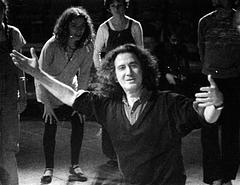 |
|
----- LAI ----- |
| Home |
| Who We Are |
| Events |
| Workshops and Services |
| ZEGG-Style Forum |
| Theater Of the Oppressed |
| Community |
| Sustainability |
| Wilderness |
| Honoring the Sacred |
| Contact Us |
What Is Theater of the Oppressed?
The Theater of the Oppressed, established in the early 1970s by Brazilian director and Workers' Party (PT) activist Augusto Boal, is a form of popular theater, of, by, and for people engaged in the struggle for liberation. More specifically, it is a rehearsal theater designed for people who want to learn ways of fighting back against oppression in their daily lives.

In the Theater of the Oppressed, oppression is defined, in part, as a power dynamic based on monologue rather than dialogue; a relation of domination and command that prohibits the oppressed from being who they are and from exercising their basic human rights. Accordingly, the Theater of the Oppressed is a participatory theater that fosters democratic and cooperative forms of interaction among participants. Theater is emphasized not as a spectacle but rather as a language designed to: 1) analyze and discuss problems of oppression and power; and 2) explore group solutions to these problems. This language is accessible to all.
Bridging the separation between actor (the one who acts) and spectator (the one who observes but is not permitted tointervene in the theatrical situation), the Theater of the Oppressed is practiced by "spect-actors" who have the opportunity to both act and observe, and who engage in self-empowering processes of dialogue that help foster critical thinking. The theatrical act is thus experienced as conscious intervention, as a rehearsal for social action rooted in a collective analysis of shared problems of oppression. This particular type of interactive theater is rooted in the pedagogical and political principles specific to the popular education method developed by Brazilian educator Paulo Freire: 1) to see the situation lived by the participants; 2) to analyze the root causes of the situation; and 3) to act to change the situation following the precepts of social justice.
a) Games and techniques highlight the process of self-awareness and self-empowerment as the interplay of individual and collective modes of experience. The point of departure is always individual experience that progressively becomes amplified to the point of reflecting and containing within itself the diversity of a shared group experience. Thus, individual experience is valued both for itself and as a means of reinforcing the main focus of the process: the gradual_ construction of a shared group experience.
b) The techniques of Image Theater, based on the use of living body imagery, are designed to strengthen in each individual the skills of observation and dialogue required for effective group interaction. Rejecting interpretation as a search for truth that impoverishes the connotative potential of each image, Image Theater stresses: a) descriptions of concrete phenomena that occur in the here-and-now, and can be corroborated by others. Image Theatre can also be described as a series of physical exercises and games designed to uncover essential truths about society, culture, self, etc. Using their own and others' bodies as "clay", participants "sculpt" statues -- still images representing their experiences, feelings, ideas, oppressions, and/or dreams.
Augusto Boal
Augusto Boal is a political activist and major innovator of post-Brechtian theater. He served as Artistic Director of the Arena Theater in Sao Paulo from 1956 to 1971. In the 1970s, he came under attack by the Brazilian government, resulting in his imprisonment, torture and subsequent exile. Boal has lectured, conducted workshops, and mounted productions throughout North and South America, Europe, India and Africa, and has written a number of books, including Theater of the Oppressed, Games for Actors and Non-Actors, and The Rainbow of Desire An activist in the Brazilian Workers' Party (PT), he presently resides in Rio de Janeiro. In 1992, he was elected to the City Council of Rio, a post he held for four years. Once installed in office, he adapted his theater techniques for use in city politics, with some hilarious--and sometimes rancorous--results. Members of the Center for the Theater of the Oppressed became Boal's City Council staff, and created seventeen companies of players practicing "Legislative Theater" throughout the city.
